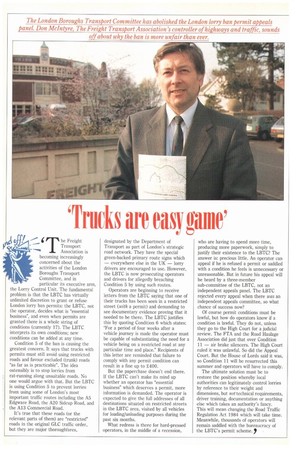'Trucks are easy game'
Page 52

If you've noticed an error in this article please click here to report it so we can fix it.
t he Freight Transport Association's becoming increasingly concerned about the activities of the London Boroughs Transport Committee, and in particular its executive arm, the Lorry Control Unit. The fundamental problem is that the LBTC has virtually unlimited discretion to grant or refuse London lorry ban permits: the LBTC, not the operator, decides what is "essential business", and even when permits are granted there is a whole string of conditions (currently 17). The LBTC interprets its own conditions; new conditions can be added at any time.
Condition 5 of the ban is causing the greatest concern. It says that trucks with permits must still avoid using restricted roads and favour excluded (trunk) roads "as far as is practicable". The idea ostensibly is to stop lorries from rat-running along unsuitable roads. No one would argue with that. But the LBTC is using Condition 5 to prevent lorries from using some of London's most important traffic routes including the AS Edgware Road, the A20 Sidcup Road, and the A13 Commercial Road.
It's true that these roads (or the relevant parts of them) are "restricted" roads in the original GLC traffic order, but they are major thoroughfares, designated by the Department of Transport as part of London's strategic road network. They have the special green-backed primary route signs which — everywhere else in the UK — lorry drivers are encouraged to use. However, the LBTC is now prosecuting operators and drivers for allegedly breaching Condition 5 by using such routes.
Operators are beginning to receive letters from the LBTC saying that one of their trucks has been seen in a restricted street (with a permit) and demanding to see documentary evidence proving that it needed to be there. The LBTC justifies this by quoting Condition 6 which states: "For a period of four weeks after a vehicle journey is made the operator must be capable of substantiating the need for a vehicle being on a restricted road at any particular time and place." Recipients of this letter are reminded that failure to comply with any permit condition can result in a fine up to £400.
But the paperchase doesn't end there. If the LBTC can't make its mind up whether an operator has "essential business" which deserves a permit, more information is demanded. The operator is expected to give the full addresses of all destinations situated on restricted streets in the LBTC area, visited by all vehicles for loading/unloading purposes during the past six months.
What redress is there for hard-pressed operators, in the middle of a recession,
who are having to spend more time, producing more paperwork, simply to justify their existence to the LBTC? The answer is: precious little. An operator can appeal if he is refused a permit or saddled with a condition he feels is unnecessary or unreasonable. But in future his appeal will be heard by a three-member sub-committee of the LBTC, not an independent appeals panel. The LBTC rejected every appeal when there was an independent appeals committee, so what chance of success now?
Of course permit conditions must be lawful, but how do operators know if a condition is lawful. They do not, unless they go to the High Court for a judicial review. The FTA and the Road Haulage Association did just that over Condition 11 — air brake silencers. The High Court ruled it was unlawful. So did the Appeal Court. But the House of Lords said it was, so Condition 11 will be resurrected this summer and operators will have to comply.
The ultimate solution must be to restore the position whereby local authorities can legitimately control lorries by reference to their weight and dimensions, but not technical requirements, driver training, documentation or anything else which takes an authority's fancy. This will mean changing the Road Traffic Regulation Act 1984 which will take time. Meanwhile, thousands of operators will remain saddled with the bureaucracy of the LBTC's permit scheme.,




























































































